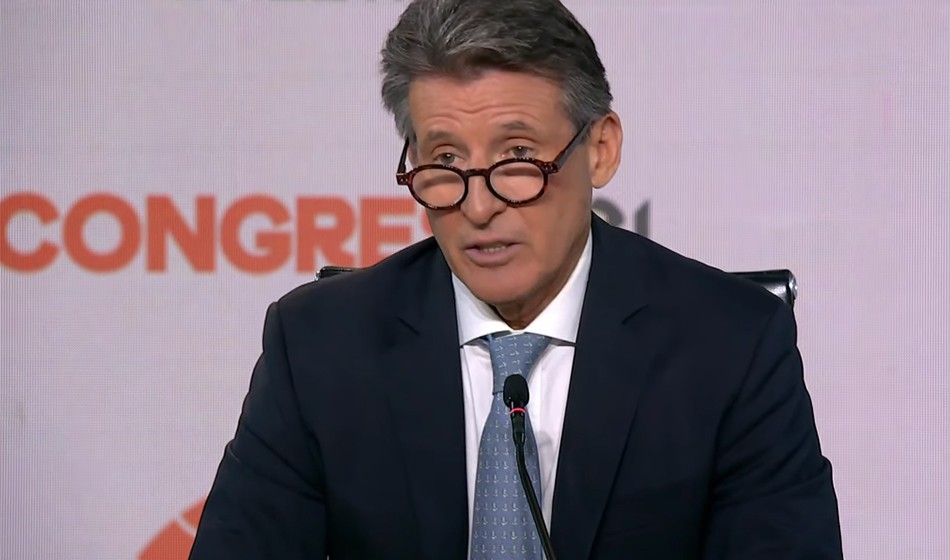
World Athletics president supports Fina stance on transgender inclusion and says his governing body will discuss their measures – as well as DSD regulations – at Council meeting
World Athletics president Seb Coe has admitted that the global governing body will look at their rules concerning the inclusion of transgender women athletes in female events at a Council meeting toward the end of this year.
The two-time Olympic champion outlined his support for the recent measures taken by Fina, swimming’s governing body, which has voted to stop transgender athletes from competing in women’s elite races if they have gone through any part of the process of male puberty. Fina has also stated an ambition to establish an open category in some events for swimmers whose gender identity is different than their birth sex.
As is highlighted in the current issue of AW magazine, a growing number of athletes are becoming increasingly concerned about how the sport of athletics might deal with this issue, insisting that transwomen who have gone through male puberty hold an unfair advantage over their cisgender opponents. There have been calls for the creation of an open category, while there is also the ongoing controversy around the regulations for athletes with Differences of Sex Development (DSD).
Currently World Athletics regulations state that transwomen can compete in female categories, provided they have undergone testosterone suppression to below five nmols/L for one year. DSD athletes, meanwhile, cannot take part in women’s races from 400m to one mile at an international competition, unless they have also lowered their blood testosterone to that same level for six months previously and maintain that level continuously.
Coe, however, insists these regulations are a “living document” and, asked for World Athletics’ reaction to Fina’s decision, he responded: “We see an international federation asserting its primacy in setting rules, regulations and policies that are in the best interest of its sport. This is as it should be. We have always believed, and repeated constantly, that biology trumps gender and we will continue to review our regulations in line with this.”
Would World Athletics consider adopting a similar policy in future? “We have always said our regulations in this area are a living document, specific to our sport and we will follow the science,” added Coe. “We continue to study, research and contribute to the growing body of evidence that testosterone is a key determinator in performance and have scheduled a discussion on our DSD and Transgender regulations with our Council at the end of the year.”
World Athletics’ DSD regulations have been kept in the spotlight by the legal challenge of former world and Olympic 800m champion Caster Semenya, while athletes such as Olympic 200m silver medallist Christine Mboma and Burundi’s Francine Niyonsaba have had to move from their preferred events of 400m and 800m respectively.
Caster Semenya with Francine Niyonsaba and Margaret Wambui (Getty)
The measures have come under criticism from those who say they go too far, but also from those who say they don’t go far enough. Coe, however, insisted they are evidence that his sport is willing to make hard decisions with sporting integrity in mind.
“Of the Olympic sports, we were the ones that took the lead on DSD and we’ve done that consistently,” he said. “We tabled the regulations, they got upheld by the Court of Arbitration and, at that point, we were really clear that proportionality meant that we identified those events with the most empirical, scientific background to show a performance enhancement, obviously four [400m] through to the mile.
“I’ve always made it clear, though, that those are under review and that in exactly the way that we spent a lot of time making sure that we weren’t going to fall foul of the Court of Arbitration on a blanket ban, which we wouldn’t have won, we were then able to absolutely look forensically at the science around the events up to and including the mile.
“But I’m not saying – and nor is our health and science team here and the council – that isn’t for review. So I think we all agree let’s see where we get to over the course of this coming season.
“Transgender is a societal issue. It’s not a new issue but, in sport, it certainly is. And, as you know, in 2019, we brought into alignment our DSD and our transgender regulations.”
He added: “Everything on our health and science – whether it’s shoe regulations, whether it’s DSD, whether it’s transgender – those days have gone where you sort of think you’ve resolved that bit and you don’t need to address it until the next president comes along. Everything is under review.
“I’m not going to speculate until we’ve got out of this season. But, look, there’s more data, it’s being collected all the time and it’s not just being collected in one or two events. We’re looking at a whole raft of data that’s coming in all the time, and if we see there is potent evidence, scientific evidence, that this data points to a seismic performance enhancement, we will act.”
The argument which polarises opinion so greatly comes to down to inclusion versus fairness. Coe, who admitted there may be a reluctance from some sports to tackle the transgender issue head on due to being unable to afford to the potential legal costs involved, is clear about which side he will always come down on.
“My responsibility is to protect the integrity of women’s sport and we take that very seriously. If it means that we have to make adjustments to protocols going forward, we will,” he said. “And I’ve always made it clear that if we ever get pushed into a corner to that point where we’re making a judgment about fairness or inclusion, I will always fall down on the side of fairness. You have to – and that’s my responsibility.
“Of course, it’s a societal issue and if one of my colleagues here in my team suddenly becomes transgender, it doesn’t make difference to me. They will continue to do the same job with skill and aplomb in exactly the way they were before they made that transition. This is not possible in sport. It is fundamental to performance and integrity and that, for me, is the big, big difference.”















 Phone: (800) 737. 6040
Phone: (800) 737. 6040 Fax: (800) 825 5558
Fax: (800) 825 5558 Website:
Website:  Email:
Email: 






